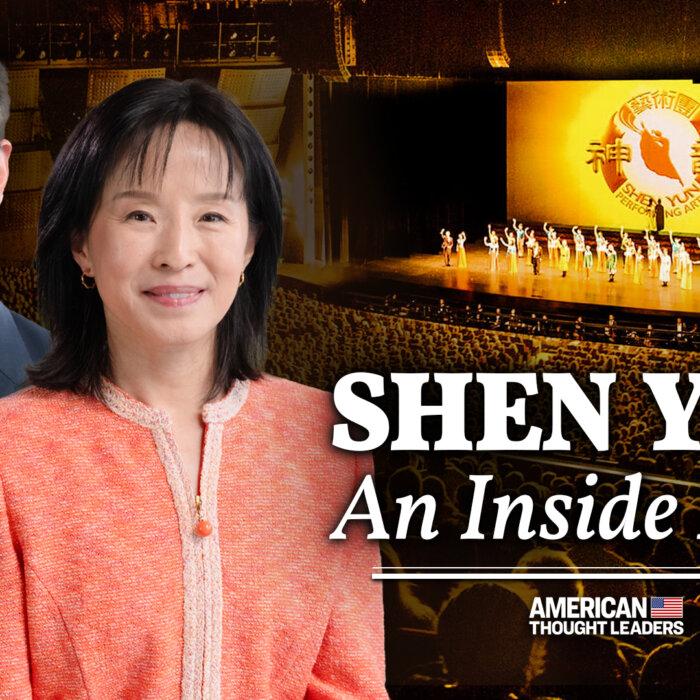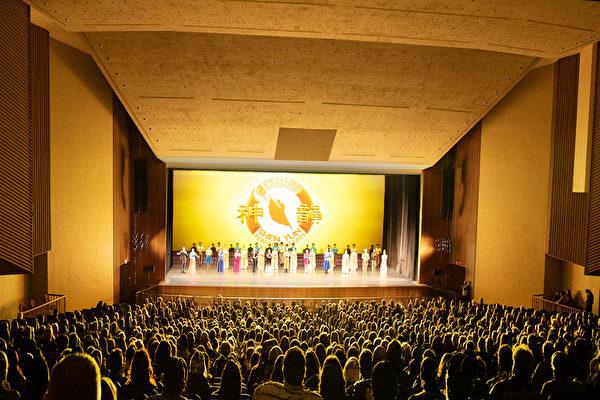The Chinese Communist Party (CCP) has for over a decade been trying to prevent people from seeing dance and music performances put up by a New York-based performing arts company.
“Virtually every theater that we go to all around the world since Shen Yun’s inception has either gotten a phone call or a letter from the Chinese embassy or the Chinese consulate putting pressure on them to not have us perform, sometimes dangling some economic benefits in front of them,” Mr. Madsen said.
“Right now, we’re experiencing some challenges in South Korea and … other countries like Indonesia, Thailand, and Vietnam,” Mr. Madsen added.
As for the motivation behind Beijing’s interference campaign, Mr. Madsen said the CCP feels threatened by Shen Yun.
“I think they’re threatened by our whole program. We’re showing 5,000 years of traditional Chinese culture, and you see divine beings on stage. We have a digital backdrop where they seem to come out of the heavens and then come to life on stage. That runs exactly counter to communist principles and their atheist ideas. That is what threatens them the most,” Mr. Madsen explained.
Traditional Chinese Culture
Ms. Chen, who said her father was the first conductor of Shen Yun’s symphony orchestra, said that communist China, as people know it nowadays, is very different from ancient China.“For thousands of years, Chinese culture has been very spiritual and strongly influenced by Buddhism, Taoism, and Confucianism. However, when the Communist Party took power in 1949, they started to eradicate all of these belief systems so that they could instill Marxism into people’s minds. It really comes down to mind control,” Ms. Chen said.
“For the last 70 years, they have changed textbooks. They basically try to brainwash people and reeducate our new generation without these traditional beliefs.”
Now, many artists in China become “propaganda tools” used by the CCP, Mr. Madsen said, while Shen Yun, being based in New York, is not “under the Chinese government’s thumb.” As a result, he added, Shen Yun has become a new promised land for Chinese artists.
“Many artists from China came to understand, ‘This is great. This is perfect. I can actually express my art form. I can convey these 5,000 years of history without some sort of political agenda,’” he said.
Mr. Madsen said he went to high school in Iowa. Because of his interest in traditional Chinese culture, he signed up for the school’s study abroad program and went to China as a high school student.
In 1996, three years before finishing university studies in China, he said he came across a spiritual practice called Falun Gong. At the time, the emcee recalled seeing news reports on television praising the spiritual practice and its health benefits. He returned to the United States before the CCP carried out its systematic elimination campaign against Falun Gong practitioners in July 1999.
“When I came upon Falun Gong, it felt to me like it was the essence of traditional Chinese culture. It brought 5,000 years together into one practice,” Mr. Madsen said.
“When Shen Yun was started by Falun Gong practitioners, it made perfect sense because it is a practice that is trying to revitalize traditional culture.”
Falun Gong, also known as Falun Dafa, is an ancient Chinese spiritual practice consisting of simple, slow-moving meditation exercises and teachings based on the principles of truthfulness, compassion, and tolerance.
Mr. Madsen said he became Shen Yun’s emcee in 2007, which was a dream come true.
“I get to go on stage every night in front of thousands of people and help the world understand that there are 5,000 years of this amazing culture,” he said.
Persecution
Shen Yun performs classical Chinese dance, ethnic and folk dance, and story-based dance, with orchestral accompaniment and solo performers, according to its website. The story-based dances include “contemporary stories of the plight and courage of Falun Dafa practitioners in China,” the website says.“We expose human rights crimes still being perpetrated in China today as we speak, including forced organ harvesting, which is taking organs from live people in order to benefit from it economically,” Ms. Chen said. “It’s something you cannot even imagine, but it has been happening in China.”
“My brother was once incarcerated in a labor camp for 18 months in China. He went through some brutal torture there, and at the time, we thought he would never make it out of there. Thankfully, he did,” Ms. Chen added.
Some of Shen Yun’s performers have been victims of persecution in China or have family members who are victims, according to the company’s website.
“I have a home that I can’t return to,” Mr. Wang said, noting the high risk of him being detained and persecuted if he were to go back to China. “Even when my father died, I couldn’t see him for one last time.”
Mr. Madsen expressed optimism that Shen Yun will continue to grow in size.
“I wouldn’t be surprised if we grow past eight companies soon because sometimes we can’t even keep up with the demand,” Mr. Madsen said. “There are certain theaters that will request a show, and we have to say: ‘Sorry, we’re booked. All eight companies are booked this year.’”








